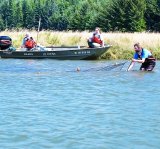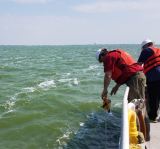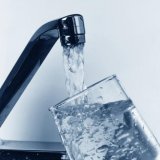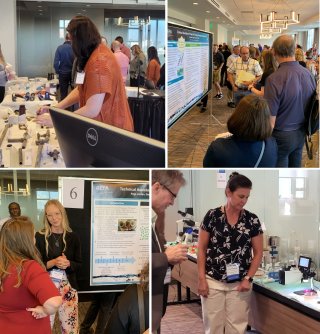Training, Outreach, and Technical Support
EPA’s Office of Research and Development values training, outreach, and technical support as a component of delivering our research results in meaningful and impactful ways. This page highlights some of the ways we are communicating our water research. Comprehensive list of research-related events
Webinar Series

EPA's Office of Research and Development hosts several webinar series, focused on different environmental topics, dedicated to delivering the latest information and training on cutting-edge research activities and results that provide assistance and solutions to environmental and public health issues.
All of the webinar series are free of charge and open to the public. There series described below are focused on water-related topics.

Water Research Webinar Series
The Water Research Webinar Series is a free quarterly series focused on sharing current research activities, scientific results, and innovative technologies developed to support EPA’s mandate to protect the chemical, physical, and biological integrity of water resources and to ensure safe drinking water and water systems.

HABs, Hypoxia, and Nutrients Webinar Series
The Harmful Algal Blooms, Hypoxia, and Nutrients Research Webinar Series is a One Environment–One Health Approach that emphasizes the dynamic connectivity between people, animals, and the environment. series focused on communicating the latest, cutting-edge research related to nutrients and the priority impacts of nutrient pollution: HABs and hypoxia. EPA regional priorities and regulatory updates are also included.

Small Drinking Water Systems Webinar Series
The Small Drinking Water Systems Webinar Series is a free monthly series that communicates the latest information on solutions for challenges facing water systems. It’s designed for state, and territory, and tribal personnel responsible for drinking water regulations compliance and treatment technologies and others in the drinking water sector.
Annual Drinking Water Workshops

To support the efforts government agencies with assisting small systems, EPA's Office of Research and Development and Office of Water, in partnership with the Association of State Drinking Water Administrators (ASDWA), has held an annual drinking water workshop for over 20 years to provide timely technical and regulatory information relevant to small systems. Under the Safe Drinking Water Act, a system is considered small if it serves 10,000 or fewer people.
When the first workshop was held in 2004, it was by invitation only and designed as an educational opportunity for state staff working with small communities to install arsenic treatment technologies. In 2008, at the encouragement of state agencies, the workshop was opened to the public and expanded to include small drinking water system distribution, water quality, source water, treatment, and operations topics.
Beginning in 2024, the workshop is designed for EPA; ASDWA; and Tribal, state, and territory personnel responsible for drinking water regulations compliance and treatment technologies permitting (primacy agencies). Focusing on the most pressing challenges facing small systems, the workshops provide current information, resources, training, and networking opportunities needed to help in building systems capacity and sustainably and with providing equitable access to drinking water.
Technical Support
EPA’s Office of Research and Development provides water-related, including drinking water, technical support requested by EPA's regional and program offices; Tribal, state, and territory government agencies; and other on-the-ground decision makers. The accurate and complete accounting of technical support interactions is critical to meet their needs in a timely manner and to better track trends and inform research.
Partner Support Stories
EPA's research helps states, tribes, and communities address on the ground environmental challenges. EPA compiles stories to illustrate how our collaborative work has supported our partners’ efforts to protect human health and the environment. Water research stories provide examples how state environmental agencies and public health departments, in particular, are using EPA research results, decision support tools, and technical solutions to address environmental issues.
Fact Sheets
- Consumer Tool for Identifying Point-of-Use and Pitcher Filters Certified to Reduce Lead in Drinking Water
- How to Identify Lead Free Certification Marks for Pipes, Fittings, Fixtures, Solder, and Flux Used for Drinking Water
Newsletters and News Releases

Science Matters Newsletter
Browse stories that highlight the latest research activities from EPA's Office of Research and Development.
News Releases
Browse the EPA Newsroom to find public service announcements, news releases by topic or language, or find news about what EPA is doing in your region.
